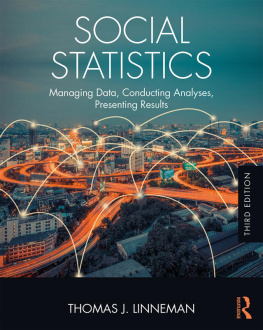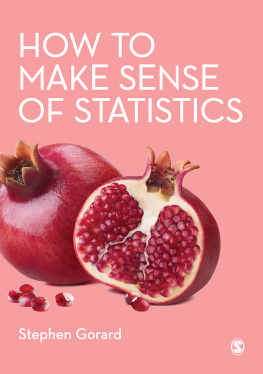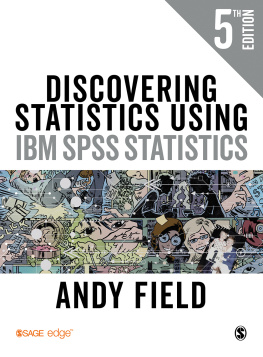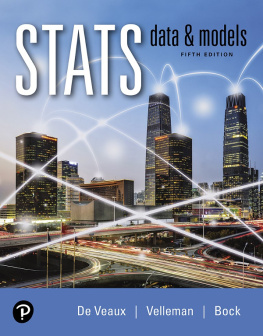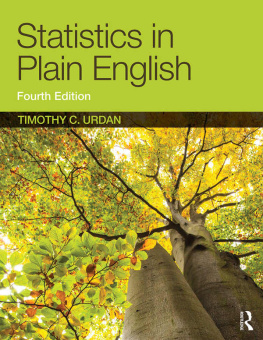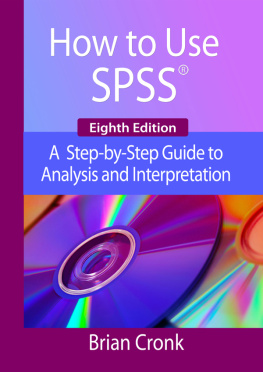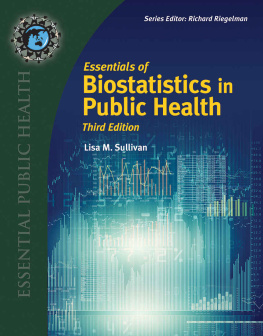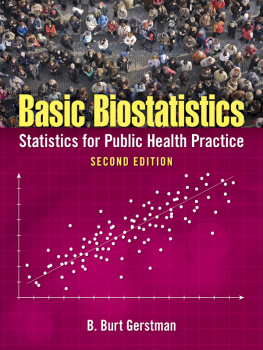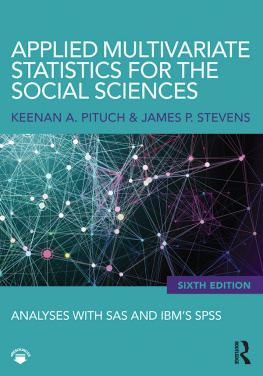Social Statistics
With a clear and engaging writing style and strong examples from the real world, this text covers current statistical techniques at an introductory level and emphasizes the clear presentation of results to a variety of audiences, making the course more useful to students and their careers. Interconnection features among chapters help students understand how all of the techniques fit together. Using varied data sets, the text features a highly rated companion website that includes videos of the author offering step-by-step explanations of how to carry out the techniques, interpret the results, and present them to varied audiences.
New to this Edition
- More inter-chapter connections have been added to improve students' conceptual learning.
- Several examples (on immigration, health, and civil rights) now permeate the text for easy comparison of techniques across chapters.
- The section on managing data is considerably expanded to cover topics such as finding new sources of data, dealing with missing data, and how to combine data reliably.
- Very current examples from the scholarly literature from criminology, education, and health show how researchers use each chapter's techniques to tell compelling stories.
- Instructors can choose from a variety of greatly expanded materials to enhance their lectures: engaging animations of key concepts, dynamic demonstrations of how statistics change in line with the data; short lectures on difficult-to-explain topics; and in-class exercises that will help students learn how to make sense of statistical results.
Thomas J. Linneman is Professor of Sociology at the College of William and Mary in Williamsburg, Virginia, where he has won several teaching awards for his rigorous and innovative courses.
Sociology Re-Wired
Edited by Jodi OBrien, Seattle University, and Marcus Hunter, University of California, Los Angeles
Sociology Re-Wired captures this combustible moment in American and global societies with new books that innovate and re-configure social and political issues. This hybrid series publishes timely, relevant, original research and textbooks that address significant social issues informed by critical race theory, Black feminism and Queer Studies traditions. Series books are written in a publicly accessible, multi-vocal style, broadening the reach and impact of significant scholarly contributions beyond traditional academic audiences.
Some titles published in this series were published under an earlier series name and a different editorship.
Published:
Understanding Deviance: Connecting Classical and Contemporary Perspectives edited by Tammy L. Anderson
Transforming Scholarship: Why Womens and Gender Studies Students are Changing Themselves and the World, Second Edition by Michele Tracy Berger and Cheryl Radeloff
Who Lives, Who Dies, Who Decides?: Abortion, Neonatal Care, Assisted Dying, and Capital Punishment, Third Edition by Sheldon Ekland-Olson
Life and Death Decisions: The Quest for Morality and Justice in Human Societies, Second Edition by Sheldon Ekland-Olson
Gender Circuits: Bodies and Identities in a Technological Age, Second Edition by Eve Shapiro
Migration, Incorporation, and Change in an Interconnected World by Syed Ali and Douglas Hartmann
Sociological Perspectives on Sport: The Games Outside the Games by David Karen and Robert E. Washington
Social Theory Re-Wired: New Connections to Classical and Contemporary Perspectives, Second Edition by Wesley Longhofer and Daniel Winchester
Social Statistics: Managing Data, Conducting Analyses, Presenting Results, Third Edition by Thomas J. Linneman
Forthcoming
All Media are Social by Andrew Lindner
Social Statistics
Managing Data, Conducting Analyses, Presenting Results
Third Edition
Thomas J. Linneman
First published 2018
by Routledge
711 Third Avenue, New York, NY 10017
and by Routledge
2 Park Square, Milton Park, Abingdon, Oxon, OX14 4RN
Routledge is an imprint of the Taylor & Francis Group, an informa business
2018 Taylor & Francis
The right of Thomas J. Linneman to be identified as author of this work has been asserted by him in accordance with sections 77 and 78 of the Copyright, Designs and Patents Act 1988.
All rights reserved. No part of this book may be reprinted or reproduced or utilised in any form or by any electronic, mechanical, or other means, now known or hereafter invented, including photocopying and recording, or in any information storage or retrieval system, without permission in writing from the publishers.
Trademark notice : Product or corporate names may be trademarks or registered trademarks, and are used only for identification and explanation without intent to infringe.
Library of Congress Cataloging-in-Publication Data
Names: Linneman, Thomas John, author.
Title: Social statistics: managing data, conducting analyses, presenting results / Thomas J. Linneman.
Description: Third Edition. | New York: Routledge, 2018. | Revised edition of the author's Social statistics, 2014. | Includes bibliographical references and index.
Identifiers: LCCN 2017016920 (print) | LCCN 2017020098 (ebook) | ISBN 9781315391823 (Ebook) | ISBN 9781138228627 (hardback) | ISBN 9781138228634 (pbk.) | ISBN 9781315391823 (ebk)
Subjects: LCSH: Social sciencesStatistical methods. | Statistics.
Classification: LCC HA29 (ebook) | LCC HA29 .L83118 2017 (print) | DDC 519.5dc23
LC record available at https://lccn.loc.gov/2017016920
ISBN: 978-1-138-22862-7 (hbk)
ISBN: 978-1-138-22863-4 (pbk)
ISBN: 978-1-315-39182-3 (ebk)
Typeset in Times New Roman
by Apex CoVantage, LLC
Guide
Instructors of introductory social statistics face an unenviable quandary. They want to give their students the skills they need to succeed in the real world of social research, but they realize that if they push their students too far, they risk losing them altogether. Some instructors understandably surrender to this latter concern, opting to teach their students the more basic statistical procedures. Unfortunately, such procedures are seldom used in the real world, so teaching students these techniques will not prove useful for them in the long run. If instructors do decide to introduce their students to more contemporary techniques, they encounter course materials that were not developed with the introductory student in mind. This was the position in which I found myself a number of years ago, and I ultimately reached a decision to do something to remedy this dilemma. Social Statistics: Managing Data, Conducting Analyses, Presenting Results is my solution. It is the first statistics text that ventures to cover both classic and contemporary techniques in an approachable way that will engage the typical introductory student and make her eager rather than anxious to study this wide array of techniques.
If you compare the table of contents with those of other introductory statistics texts, you will see some similarities and some major differences. The first half of the book contains, on the surface, many of the similarities. The early chapters include many of the topics that one might find in other books: tables and graphs, measures of central tendency and variation, probability distributions, chi-square tests, confidence intervals, t -tests, ANOVA, and bivariate regression. I cover these topics innovatively and efficiently in order to prepare the students for the rest of the book. In the second half of the book, students gain significant exposure to a variety of multiple regression techniques that they will find in the real world of social research: reference groups, nested modeling, standardized effects, interaction effects, logistic regression, path analysis, and nonlinearity. In stark contrast to many books with such coverage, I handle these topics at a level that introductory statistics students will find approachable and engaging. For most beginning statistics students in the social sciences, this is the one and only statistics course they will take. If they use Social Statistics: Managing Data, Conducting Analyses, Presenting Results , they will leave the course with a strong and varied set of skills that will serve them well as they try to navigate the social science literature or acquire a job.

